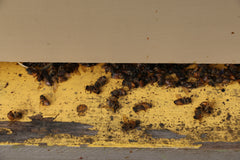
I’ve received several emails and calls this month from upset beekeepers. Most have made a lot of really good decisions and cared well for their bees going into winter. But then, after a few cold nights they’ve found a pile of dead bees in the entrance of their hives. Not just tens but hundreds! It looks as though the entire colony has succumbed to our harsh Michigan winter before it even struck its first real blow.
 I’ve learned to never count my bees out. Losses of this magnitude are normal this time of year. Honeybees lose the remainder of their summer bees which are not genetically designed to survive the long winters. However, the winter bees are there to cluster and keep the queen at around a toasty 94 degrees F. They are a hardier bee with fat stores appropriate for survival of such conditions.
I’ve learned to never count my bees out. Losses of this magnitude are normal this time of year. Honeybees lose the remainder of their summer bees which are not genetically designed to survive the long winters. However, the winter bees are there to cluster and keep the queen at around a toasty 94 degrees F. They are a hardier bee with fat stores appropriate for survival of such conditions.
 How can you help? Be sure their entrance is open for both ventilation and removal of dead bees. You might peek in the entrance and see pile of them! Grab a stick and scrape them out. Dead bees can clog an entrance and kill the colony.
How can you help? Be sure their entrance is open for both ventilation and removal of dead bees. You might peek in the entrance and see pile of them! Grab a stick and scrape them out. Dead bees can clog an entrance and kill the colony.
On a warmer sunny day, (high 40’s) watch the hive. You will probably see a bee or two brave the cold and take flight. If you see that, you can know that your colony is most likely alive and well. A lone bee or two would never survive without a cluster inside to keep it warm.
If it gets into the 50’s you might even sneak a peek inside the lid. Just keep in mind that you risk disturbing them in a very important mode of survival. Do not do anything to agitate them or break the cluster. The most you will probably see is slight movement of the bees all clustered down in your lower box.
 I have a thermal camera which comes in VERY handy. I attached to my iphone.. I can see which colonies are clustering, the size of the cluster and get an idea as to where they are in the hive. At this time of year they should be down low. In late Winter/Early Spring they should be up high. And when they are, I need to ensure that they have appropriate food stores or have a supplemental food source like sugar.
I have a thermal camera which comes in VERY handy. I attached to my iphone.. I can see which colonies are clustering, the size of the cluster and get an idea as to where they are in the hive. At this time of year they should be down low. In late Winter/Early Spring they should be up high. And when they are, I need to ensure that they have appropriate food stores or have a supplemental food source like sugar.
The last thing we can all do is use this down time in winter to study-up and learn as much as we can to become better beekeepers in 2018. Oh yeah, one more thing….keep our fingers crossed!
My dog, Pete out working the hives with me!

